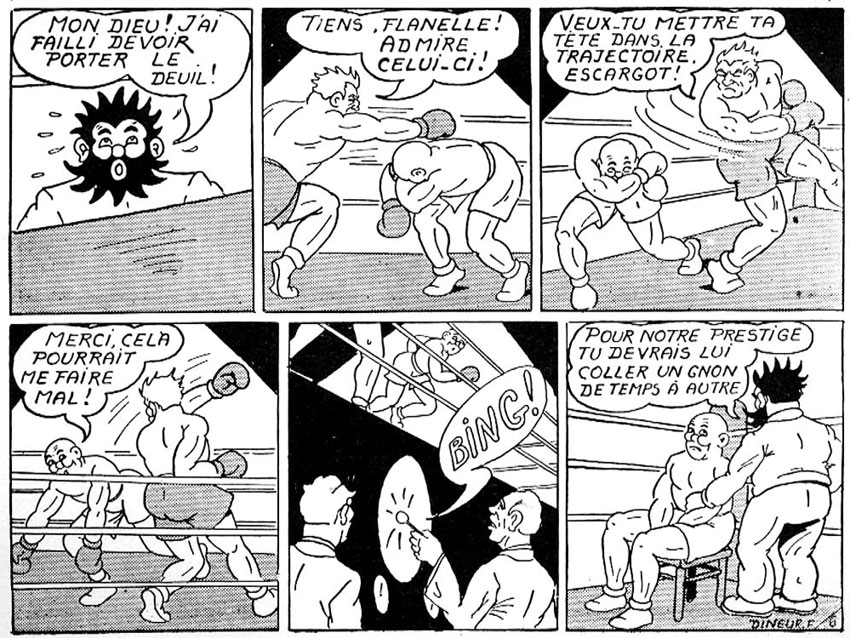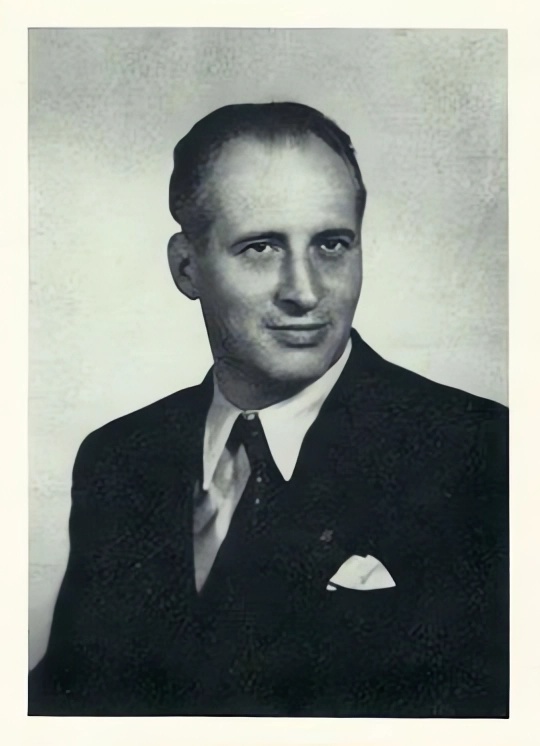'Tif et Tondu' (Spirou, 8 January 1942).
Fernand Dineur was a Belgian comic artist, most notable as the original creator of 'Tif et Tondu' (1938-1997), one of Spirou magazine's oldest and longest-running series. Yet he only drew the bald and bearded adventurous duo for little over a decade, before being replaced by Will. Overshadowed by his successors and dying long before academic and public interest in older comics became commonplace, Dineur became a largely forgotten figure in Belgian comic history. Besides Spirou, Dineur has appeared in several other publications, including the comic magazine Héroïc-Albums and the newspaper Le Soir, with a variety of other comic features, mostly starring detectives or silly loafers.
Early life and career
Fernand Dineur was born in 1904 in Anderlecht, a bilingual suburb of Brussels. Even though he enjoyed drawing as a child, becoming an artist was not his initial goal. In one of the 21st century reprint editions of 'Tif et Tondu', his son Paul described his father as a whimsical and mysterious man. Even to him, his father's past had many question marks and surprises. After spending a year at the Free University of Brussels, Fernand Dineur dropped out. As a young man, he spent two years working as a civil servant in the Belgian colony Congo. In 1930, after contracting malaria and beriberi, he hastily returned to Belgium, where he moved on to study criminology in order to join the police force, while he also worked as a butcher for a while.
To earn some extra money, Dineur also began making gag cartoons for various magazines, including Prenez-moi, Sans Blague, A-Z and Week-end, as well as the newspaper Le Soir. In 1937, he began his collaboration with the publishing house of Jean Dupuis as a contributor to Le Moustique magazine. Between 17 August 1937 and early 1938, Dineur created 21 gags of 'Les Tribulations de Prosper', a simple humor strip about an ordinary man. With its six-panel gags and usage of speech balloons, this comic holds historical significance as the first original comic strip in a magazine by Dupuis.
First episode of 'Les Aventures de Tif'.
Tif et Tondu
In 1938, publisher Jean Dupuis launched the oldest still-existing Belgian comic magazine, Spirou. Together with the Frenchman Robert Velter, Dineur was among the first original contributors to the magazine. Present in its first issue of 21 April 1938, Dineur debuted with 'Les Aventures de Tif', about the adventures of a bald freeloader. In his first adventure, Tif strands on a deserted island, where he meets a castaway who becomes his sidekick, the bearded captain Tondu. The series was soon retitled 'Tif et Tondu' and became one of the longest-running comic series in Spirou's history, apart from Velter's 'Spirou' feature.
Dineur's 'Tif et Tondu' was created in a jolly, folksy and naïve style. Improvising the plots as he went along, Dineur sent his heroes on adventures in all sorts of exotic locations, fighting gangsters and other crooks. For the 1939 serial 'Tif et Tondu au Congo Belge', he could rely on his experiences in the Belgian colony for his depictions of the locale and the people. But otherwise, the episodes were created with the same naivety as other comics from that era, gradually floating from one narrative into the other.
'Tif et Tondu' from the Spirou Almanach 1944. Dutch-language version.
In October of 1938, Spirou received a Dutch-language edition called Spirou, in which 'Tif et Tondu' appeared as 'De Baard en de Kale'. Strangely enough, the translators didn't pick up on the joke with the original character names. In French, the bald character was named "Tif", literally meaning "hair", and the bearded one was called "Tondu", meaning "shaven". The Dutch translators switched their names around, naming the bald one "Kale" ("Baldy") and the bearded one "Baard" ("Beard"), making the names consistent with their looks. In the decades that followed, the translator on duty occasionally translated the original French text, resulting in the characters addressing one another with their own names. Another series that switched character names in translation was the Spanish comic 'Mortadelo y Filemón' by Francisco Ibáñez. Translated in Dutch as 'Paling en Ko', the name "Paling" ("eel") did not refer to the tall, flexible one of the duo, but instead to the short one.
'Flup, Détective' (Spirou, 24 September 1942).
Other Spirou comics
Apart from his signature series, Dineur also created a couple of other comic features for Spirou, for instance the funny animal tale 'Les Exploits de Bib, Rip, Fitt et Jop' (1939-1940), about respectively a dog, a donkey, a monkey and a wild boar. For a period of eight years, Dineur created 'Les Enquêtes de Flup, Détective' (1938-1946), a whodunit column in which readers had to solve mystery by carefully studying Dineur's illustrations.
Loss of popularity
During the World War II years, Tif and Tondu became popular characters among Spirou readers. Together with Rob-Vel's 'Spirou', Jijé's 'Jean Valhardi' and Sirius' 'L'Épervier Bleu', Dineur's creations were part of the magazine's original comic series, appearing alongside translated material from the United States. In 1941, Dupuis released a comic book compilation, 'Les Avontures de Bibor et Tribar - Tif et Tondu' (1940), collecting adventures of both Dineur's 'Tif et Tondu' and Rob-Vel's 'Bibor et Tribar'. It was the second comic book of the publisher, following 'Les Aventures en Afrique de Fred, Mile et Bob, Gamins Belges' (1940) by François Gianolla.
After the war, the 'Tif et Tondu' series gradually lost its prominence, both with readers as with the editors. By then, Spirou magazine had attracted a new generation of talented artists, including André Franquin, Morris, Eddy Paape and Victor Hubinon. Their stories and artwork stood out for their quality and graphical skills, while Dineur still improvised his comics without bothering too much with pacing, lay-outs, logic or realism. A quick worker, Dineur was known to produce a comic page within two hours. Even though his approach gave the 'Tif et Tondu' stories a certain charm, this old-fashioned way of creating comics was no longer in vogue after the war.
As a result, the Spirou editors often treated Dineur's comic as a filler rather than a prominent feature. Most episodes were printed in black-and-white in a small format, whisked away beneath an editorial page or another comic. Still, the publisher wanted to keep the characters, and lengthy negotiations ensued about Dupuis either acquiring the rights to the series, or Dineur agreeing to working with more talented assistants. Soured by this lack of appreciation, Fernand Dineur instead took his characters to Fernand Cheneval, publisher of the Héroïc-Albums comic book series. Over the course of 1949, Dineur created eleven short stories with 'Tif et Tondu' directly for Héroïc, much to the chagrin of Dupuis.
'S.O.S.', a 'Tif et Tondu' story published in Héroïc-Albums #49, 1949.
Not wanting to see their characters go, Dupuis agreed that Dineur was allowed to keep writing the scripts and guide his successor, while continuing to discuss the acquisition of the rights. In 1949, 'Tif et Tondu' reappeared in Spirou after a year-long absence, this time drawn by the young artist Will. As agreed, Dineur was still writing the stories, while Will initially maintained the original graphical looks of the characters as created by Dineur. Between 1949 and 1951, Dineur and Will collaborated on six new serials with the characters, until in May 1951, Dineur was finally bought out by his publisher. Once the deal was made, Dineur instantly dropped every involvement he had with the series, leaving in the middle of the ongoing story 'La Villa Sans-Souci'.
In the decades that followed, Will made the series his own, taking it to new creative heights with several talented scriptwriters. After creating a couple of episodes written by either Henri Gillain or Albert Desprechins, he teamed up with Maurice Rosy to turn the 'Tif et Tondu' comic into an exciting adventure comic with fantasy elements, along the way introducing the heroes' iconic nemesis, the mysterious "Monsieur Choc". Under Rosy's successors Maurice Tillieux and then Stephen Desberg, the adventures became true crime thrillers with occasional sci-fi touch. Between 1990 and 1997, the two heroes had their final incarnation as a detective duo written by Denis Lapière and drawn by Alain Sikorski.
'Les Confidences de Nant, policier'. One of Fernand Dineur's final comic pages, published in Héroïc-Albums on 26 September 1956.
Final years and death
As his prominence in Spirou magazine declined after the war, Dineur had begun offering his services elsewhere. For many years, he combined his work as a cartoonist with a second job as sales representative for Caulier beer. Already in 1940, Dineur had produced the pantomime comic feature 'Poupotte le Joyeux Clochard' (1940) for the newspaper Le Soir. This feature returned in 1945 in Jeep, a comic magazine published by Guy Depière. For the same publisher, he also created 'Furette', printed in Bimbo magazine (1945). Also for Le Soir, Dineur created the crime cases of 'Les Confidences de Nant, policier', in 1946 collected in book format by Gordinne in Liège. In the same year, Gordinne released another comic book with work by Dineur, 'Filoche, maître fripon' ("Filoche, master rascal"). In Prenez-moi appeared the Wild West adventures of the Dineur creation 'Cap Joc'.
'Poupotte le Joyeux Clochard'.
By 1948, Dineur was working regularly for Fernand Cheneval's Héroïc-Albums. Besides the previously mentioned 1949 episodes of 'Tif et Tondu', he created the riddle feature 'Enquêtes du Détective Ric' (1948-1952), gags with 'Le Baron Louf' (1949) and new installments of his crime series 'Les Confidences de Nant, Policier' (1955-1956), first as illustrated stories, then as his final comic serial. In addition, he wrote the scripts for 'Attila' (1950-1951), a series drawn by Cheneval.
Even though many sources mention April 1956 as the date of Fernand Dineur's death, the 2017 re-edition of Dineur and Will's joint 'Tif et Tondu' stories by publisher Dupuis says 26 March 1958 was the day he died in Diegem, following a long illness. The artist was 53 at the time. His final comic project, 'Les Légendes Belges', remained unfinished and unpublished.
Fernand Dineur.
Legacy
While Dineur was a Belgian comic pioneer and creator of a popular series with a remarkable longevity, he has remained an unsung hero. His work has rarely been reprinted and is almost forgotten today. A major reason was his untimely death, which happened one decade before comics were revalued and appreciated by both public and critics. Had he lived a little longer, Dineur may have become a household name amongst comic book aficionados. He still remains caught in the shadow of his successors.
Nevertheless, publisher Michel Deligne collected much of Dineur's older comics in five volumes of the 'Rétrospective Fernand Dineur' series (1976). In the early 1980s, Albino published several of Dineur's 'Tif et Tondu' stories in book format for the first time. Between 2008 and 2012, Éditions du Taupinambour released another book series with many of the early 'Tif et Tondu' stories by Dineur. At Dupuis, 'Tif et Tondu en Amérique centrale' (1956) was for a long time the only installment in the official 'Tif et Tondu' book series that contained stories written by Dineur. Only during the reprint wave of the 1980s was Will and Dineur's 'La Villa Sans-souci' retroactively included in the series as book number #1. In 2017, Dupuis collected all of the stories created by Will and Dineur in the one-volume 'L'intégrale 1949-1954'.












